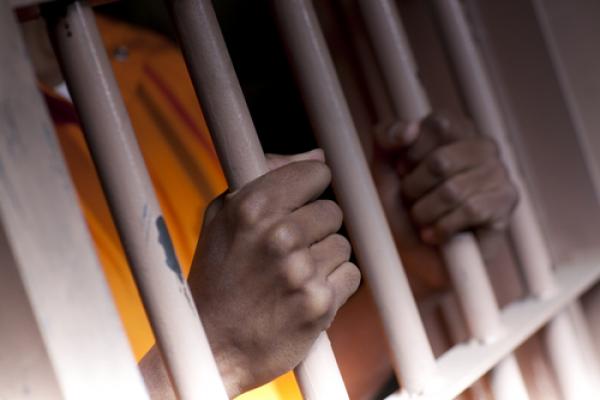The United States has the highest incarceration rate in the world;one third of those incarcerated are serving long-term sentences for petty, non-violent crimes. One out of three African-American men will serve some sort of time under present law enforcement practices and the current criminal justice system. In Washington, D.C., that number jumps to an estimated three out of four. The United States imprisons a larger percentage of its black population than South Africa did at the height of apartheid.
More than 50 people gathered at Emmanuel Church of God in Christ in southeast Washington, D.C., on Sunday afternoon to hear the Rev. Louis Hutchinson remind them of these facts. Rev. Donnell Smith called the trend: “legalized discrimination.”
“There is an incarceration of silence; there is a new slavery; there is a new Jim Crow,” began Rev. Hutchinson, likening the present mass incarceration of blacks to the old segregation laws. It’s an idea popularized by author Michelle Alexander in her book, The New Jim Crow: Mass Incarceration in the Age of Colorblindness. Rev. Hutchinson continued preaching, to a chorus of “Amens” and “that’s rights:”
“It is time for the church to shed its shackles of capitalistic silence and respond to the cries of our brothers and sisters in prison, who ask: ‘How long?’
It is time for systemic revolution. It is time to speak prophetically to the boardrooms of Fortune 500 companies who profit off of the prison industrial complex. It is time to speak truth to power.
Now is the time to show the world what God’s love looks like.
Now is the time to fight against injustice.
Now is the time to be the church.
The church can no longer wait.
It is time for the church to respond to these cries of our brothers and sisters with: ‘Not long.’”
The gathering is the first of six revival meetings during 2013 under the Why We Can’t Wait movement begun by Rev. Rebecca Stelle. Stelle notes that while we no longer oppress explicitly on the basis of skin color, we do deny people rights and opportunities on the basis of whether they’ve been incarcerated. And it just happens that we lock up an awful lot of black and brown people. Stelle and others believe this is an intentional and systemic problem.
The goal of Why We Can’t Wait is to gather Christians from churches across Washington, D.C., to come together to learn and pray about this issue through revival gatherings that feature discipleship training in the tradition of non-violence, teaching from Michelle Alexander’s book, and preaching that reminds us that this is not the way God wants his people to live.
“One of Martin Luther King, Jr.’s six principles of non-violent movement, one that must undergird our entire enterprise,” noted Rev. Stelle, “is that the universe is on the side of justice. As King said, the arc of the moral universe is long, but it bends toward justice. Somehow or other, God will have his way with us, and there will be justice.”
The timing of this movement intentionally coincides with the 50th anniversary of the civil rights efforts of 1963. It was 50 years ago, on April 16, 1963 that Martin Luther King, Jr., wrote the “Letter from Birmingham Jail.” In that letter King states:
“In any nonviolent campaign there are four basic steps: collection of the facts to determine whether injustices exist; negotiation; self-purification; and direct action… There was a time when the church was very powerful, in the time when the early Christians rejoiced at being deemed worthy to suffer for what they believed … Things are different now.”
In this anniversary year marking such profound efforts toward civil rights, may God again stir his people to come together in the call for justice!
You can read more about the series at becomingchurch.org, and you can follow the movement on Facebook and Twitter.
Rev. Bryan Berghoef is the pastor of Roots DC and the author of Pub Theology: Beer, Conversation, and God. You can read his latest at pubtheologian.com, or follow him on Twitter.
Image: Hands behind bars, Dan Bannister / Shutterstock.com
Got something to say about what you're reading? We value your feedback!
